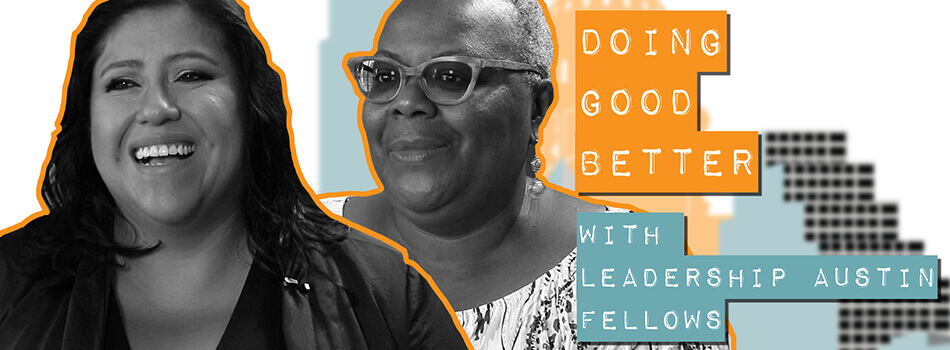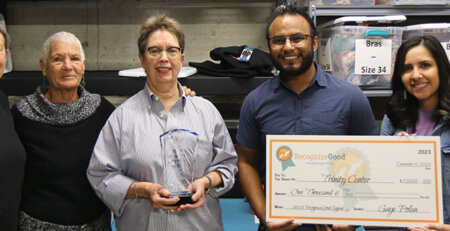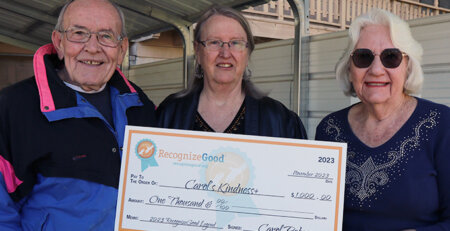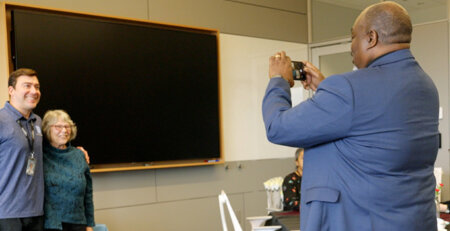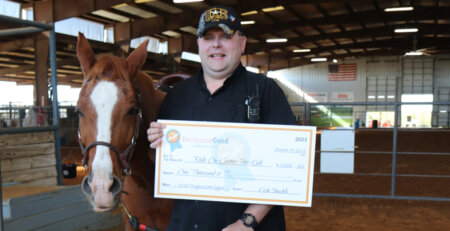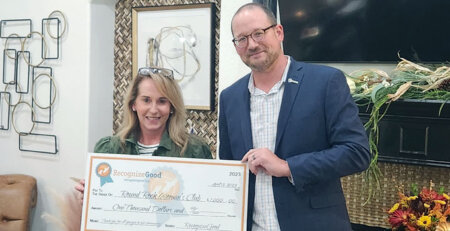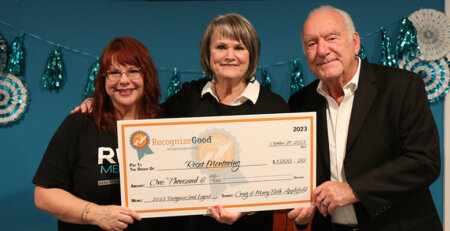Doing Good Better: Leadership Austin Fellows – Brenda Coleman-Beattie + The New Philanthropists
People do good for others every day in the community surrounding Austin. At RecognizeGood, our mission is to help strengthen that community by sharing those inspiring examples. In our Doing Good Better series, we take a docu-series look into innovative collaborations around the Austin area that make our community stronger. Leadership Austin launched a pilot Fellows Program to connect experienced retirees with sustainability-building projects that nonprofits often don’t have the resources to execute. Projects that require a different caliber of candidate.
Longtime public sector advocate Brenda Coleman-Beattie joined The New Philanthropists to structure outreach, engagement, and sustainability around their mission to proactively create more diverse and inclusive nonprofit boards.
“Nothing’s going to be perfect. I envision that if we try A, and it doesn’t work, we’re going to get to Z and start all over again, to get closer to the ideal – where we’re participating, and there’s evidence of representative impact in our community in terms of how we engage with one another and how we live.”
RecognizeGood: What does having a community leader like Brenda come in as a leadership boss and Fellow do for the promotion of your goals and mission overall?
Paulina Artieda, Executive Director at The New Philanthropists: Brenda came in at a pivotal time in our launch, because there was a momentum of people understanding, loving and wanting our organization to be around. I think once she understood what we were doing, she automatically synced in on many levels and shared her knowledge with us. It came from her lived experience. Something that she really came in and helped us with was laying the groundwork on how to build partnerships and outreach, in terms of growing our recruitment for leaders of color. She was critical in addressing how we would approach partnering with nonprofits and understanding how we build those relationships, and how to help them feel good about the diversity changes they were going to make. So she was very crucial to us, giving us her experience of sitting on tons of nonprofit boards, but her professional background helped a lot as did her social background – Brenda just knows tons of people in this community. It was such a great relationship that after the Fellowship, we asked her to be a board member. And she accepted! If there’s ever somebody you can tap into, it’s her.
I think the one thing that we value when it comes to the leaders of color that want to serve on boards is their lived experience, right? That’s something that you can’t capture on your own. Not everybody is going to have the same experiences, so there’s a uniqueness to what you bring to the table – to your lived experience in the neighborhood you grew up in, how you got into school or your pathway to education. There are a lot of elements that come into that, and some people don’t put a lot of value in that. That’s where we’re saying, well, this is actually what’s going to help you serve your mission better as a nonprofit, bringing more lived experience to the table. So when it comes to that, I think boards really can have a whole new perspective on who should have a seat at that table.
RG: One of the big issues is equity, and The New Philanthropists are attacking that in a unique way. Brenda, what was the pairing like in terms of subject matter? Were you familiar with their work before the fellowship?
Brenda Coleman-Beattie, Leadership Austin Fellow: I wasn’t. But The New Philanthropists spoke to me in many ways, because I had that journey. I could relate to not having a brick and mortar, because I’ve worked with several startups. I can relate to working with phenomenal talent in a way where I didn’t assume that they were people who really had a lot to learn. When you look at [TNP co-founders Monica Williams and Mando Rayo], you’re like, oh my gosh – now those are heavyweights, folks who know what they’re doing. When I met up with them, it was kismet in a way – like saying I get you, I get the issue, and I get what you’re trying to do.
What resonated for me is that for many years, I was on several mainstream boards here. And I’ll never forget an experience with a board, as I was getting ready to move to Seattle. They said, “Well, Brenda, do you know any people like you who could serve on this board?” And this was in 1992. So what, 27 years ago? And I said, “What do you mean?” And it wasn’t malicious. These were kind-hearted, great people. So I said, “I know many people like me,” and I recommended, in this particular case, a Latina and an African American. And that Latina is now on the emeritus board of that organization, by the way. And the African American did phenomenal things. So all that is to say, my communication to those boards that have asked me, is there another me, was that there are many more people like me who equally bring phenomenal talent, the ability to give an interest in the subject matter, and we’re not an anomaly. There are many of us. And so with The New Philanthropists, I could just say I know what you’re trying to do! Because even 27 years later, there’s still a need in our community.
RG: So your project with them was essentially, figuring out how to spread the word about their mission?
Brenda: Yes, getting the word out. If I remember correctly, the business cards that they so kindly printed for me said Director of Community Engagement and Outreach. So I was a walking poster, if you will, in each and every venue that I was in. And those venues tend to be many! At my church, out in the community. I live in southwest Austin in a neighborhood where this would not have been on people’s radar screen, so when I walk in the neighborhood and talk to people, I share with them. And I was amazed to see how many people said, “You know what, I sit on a board. And we really do need more diversity.” So by virtue of that, many more people became more woke, if you will, to realizing that there are ways to help in a constructive way as we look at having more diverse boards and at the value that diverse boards bring.
RG: Paulina, what was it like bringing Brenda in? How did The New Philanthropists benefit from Brenda’s expertise and time?
Paulina: There’s just a comfort there. I think I think that’s what she brought – obviously her skill sets were amazing, but there was that comfort in knowing that we had someone that we could run ideas by. She was going to ask critical questions that would really position us to do better. Those questions that weren’t a part of our thought process at the time. So I think that’s where she’s been really, really helpful in providing feedback and asking us hard questions that we have to answer.
Brenda does a lot of research in the background before she steps into a room. So she will already ask you like, “Well, I know you’ve done this. And you’re part of this. And it’s almost like, wow, I mean, that’s inspiring, right? I like that, I don’t have to sit here and let her know about our mission in a way where I’m educating someone here. We can get right to sharing lived experiences with each other. So it was a collaborative sync up, it was almost like a mindshare situation. And I think that’s where we knew we had the right candidate – it was somebody where we didn’t have to start from the beginning.
RG: What services does that ideal collaborative coalition provide?
Brenda: The community benefits because people have a seat at the table – people of all socioeconomic, ethnic, racial, religious, sexual orientation, you name it, have a seat at the table – and their voices are heard. We all participate in our community being better and we’re listened to. It’s one thing to go to a town hall or to a meeting for the sake of process, and part of our mission says we have to have these hearings. But what are you doing with what I’m communicating? Are we listening? Are we hearing what you want, and why you want it? And are we tweaking it? Nothing’s going to be perfect. I envision that if we try A, and it doesn’t work, we’re going to get to Z and start all over again, to get closer to the ideal – where we’re participating, and there’s evidence of representative impact in our community in terms of how we engage with one another and how we live. It’s not just the Queen’s wave. No offense to the queen or her wave.
RG: Why do YOU give?
Brenda: It’s just like voting. If you vote, you can complain – if you don’t vote, then stand in line, because I don’t want to hear what you have to say. I love being part of innovative solutions for our community. So I don’t complain – I behave and I act. I participate.
Paulina: You know, it’s been a part of who I am, naturally wanting to help and to give back, but I think there’s a connection that you make with individuals when you give. There’s a sense of empathy that happens. And at the end of the day, there’s a lot of gratitude. I feel way more rewarded from giving and being a part of somebody’s life, from just understanding their journey than from anything else. And that’s been a part of how I’ve made my circle and have understood the path that I have to go in my career. I started in advertising and I was trying to make sure that advertising was going in the direction of multicultural markets and making sure I was fighting stereotypes. It wasn’t enough at some point. It wasn’t the right work for me. So now, the direction that I’ve taken is, how do I bring those skill sets into where I know it’s making an impact? To me, that’s not as superficial as advertising, but it’s really helping an individual and get to see it.
Have a great example of someone in the Austin area doing good better? Let us know!
